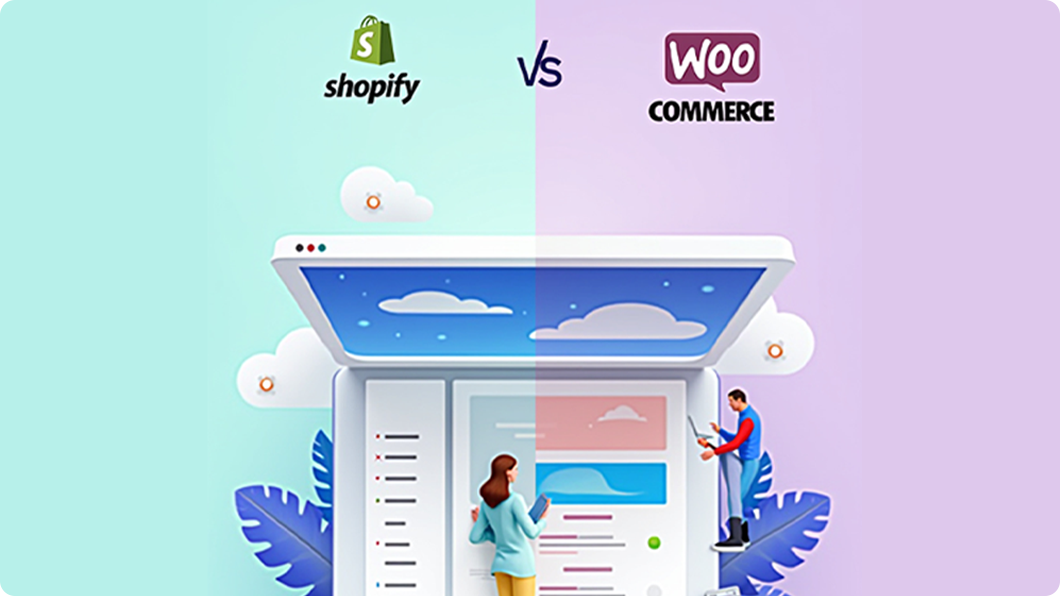
Published in:
Latest Trends
Shopify vs. WooCommerce: Which E-Commerce Platform is Right for You?
Choosing the right e-commerce platform is a crucial decision that affects your business’s growth, scalability, and profitability. Shopify and WooCommerce are two of the most popular options, each offering unique advantages and features. In this guide, we’ll compare Shopify vs. WooCommerce in terms of cost, customization, SEO, and ease of use, helping you decide which platform suits your business needs.
1. Ease of Use
Shopify: The All-in-One Solution
- Fully hosted platform with an intuitive dashboard
- No technical knowledge required; drag-and-drop builder available
- 24/7 customer support for troubleshooting
WooCommerce: A Flexible but Technical Option
- Self-hosted plugin for WordPress, requiring setup
- Requires technical knowledge for hosting, security, and maintenance
- No dedicated support; relies on community forums and documentation
Winner: Shopify (Ideal for beginners and non-technical users)
2. Cost Comparison
Shopify Pricing
- Basic Shopify: $29/month
- Shopify: $79/month
- Advanced Shopify: $299/month
- Additional costs for apps, themes, and transaction fees if not using Shopify Payments
WooCommerce Pricing
- Free to use, but requires hosting ($5–$30/month), domain ($10–$20/year), and SSL ($50/year)
- Additional costs for premium themes and plugins
- No transaction fees, but payment gateways like PayPal and Stripe have their charges
Winner: WooCommerce (More cost-effective but requires manual setup)
3. Customization & Flexibility
Shopify
- Offers 100+ professional themes (free & paid)
- Customization is possible but limited by Shopify’s proprietary Liquid code
- Shopify App Store provides thousands of third-party extensions
WooCommerce
- Full access to website code for unlimited customization
- Works with 50,000+ WordPress plugins
- Suitable for developers or businesses with unique design needs
Winner: WooCommerce (Greater flexibility but requires technical expertise)
4. SEO & Marketing Features

Shopify
- Built-in SEO features like meta tags, sitemaps, and mobile optimization
- Fast page speed and secure hosting
- Limited control over URL structure compared to WordPress
WooCommerce
- Advanced SEO capabilities with WordPress plugins like Yoast SEO
- Full control over URL structure and site performance
- Requires manual optimization for page speed and hosting
Winner: WooCommerce (More SEO-friendly, but Shopify is still strong for beginners)
5. Payment Options & Transaction Fees
Shopify
- Supports over 100 payment gateways
- No transaction fees if using Shopify Payments; additional charges for other gateways
WooCommerce
- Supports PayPal, Stripe, Square, and other third-party gateways
- No platform-imposed transaction fees
Winner: WooCommerce (No extra transaction fees, but Shopify Payments can be cost-effective)
6. Security & Maintenance
Shopify
- PCI-DSS compliant with built-in SSL and security updates
- Automatic backups and server maintenance handled by Shopify
WooCommerce
- Security depends on hosting provider
- Manual updates and maintenance required for security patches
Winner: Shopify (More secure and hassle-free)
Final Verdict: Which Platform Should You Choose?
- Choose Shopify if you want an easy-to-use, all-in-one e-commerce solution with dedicated support.
- Choose WooCommerce if you prefer customization, full control, and lower costs, but don’t mind handling hosting and maintenance.

Switch to Shopify with WebNX
Need help choosing the right e-commerce platform? WebNX specializes in Shopify development and migration services, making it easy to launch and grow your online store.
📌 Switch to Shopify with WebNX
📌 Contact WebNX for E-Commerce Solutions
Let’s build your online store for success!





